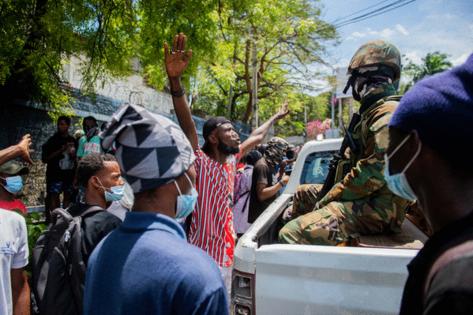Haiti human rights groups criticize plan to tap members of rogue force to fight gangs
Published in News & Features
Human-rights groups are pushing back against a proposal by Haiti authorities to enlist members of a rogue force into the fight against a powerful gang alliance carrying out a deadly siege in three of the country’s 10 regional departments.
“It’s scandalous,” said Samuel Madistin, an attorney and president of the Fondasyon Je Klere/ Eyes Wide Open Foundation. “If they want to expand the ranks of the security forces they need to recruit for the army and the police, not from an armed gang.”
The plan to enlist members of the Brigade for the Security of Protected Areas was made public on Thursday in a national address by the head of Haiti’s ruling Transitional Presidential Council, Fritz Alphonse Jean.
The brigade, which is part of the Ministry of Environment, is supposed to be in charge of protecting Haiti’s natural resources. But since its founding in 2017, it has been a controversial force implicated in criminal activities, human rights abuses and last year in an attempt to topple the government of then-Prime Minister Ariel Henry.
“It’s grave, it’s dangerous,” Pierre Esperance of the National Human Rights Defense Network said. The brigade, he added, “is not a structured corps and the environmental ministry has never had control” over them.
“A lot of them are in gangs,” he said. “If they want to expand the security forces then the government needs to accelerate recruitment and training.”
The move to tap the brigade comes as gangs continue to force people to flee their homes, set fire to houses and businesses and burn armored troop carriers from Haitian police and the Kenya-led Multinational Security Support mission. As they continue to tighten their grip on Port-au-Prince, the gangs have also moved north to capture more territories.
On Friday, members of a self-defense group joined police and the Kenya-led mission in the central Haitian city of Mirebalais in an effort to stop it from falling into gang hands. It’s estimated that as much as 80% of the town is under the control of gangs after they stormed the community on Monday, freed more than 500 prison inmates and killed two nuns. Haitian police spokesman Lionel Lazarre said he could not yet confirm whether Mirebalais had fallen.
However, he said police had arrested a former lawmaker, Alfredo Antoine, who was the police’s wanted list. Antoine represented Kenscoff in the hills above the capital and had taken to the radio earlier this year to denounce the attacks while asking for more police. He is accused of plotting to undermine national security, financing criminal organizations and participating in murder plots. He is among three high-profile individuals who have been arrested in recent months by Haitian police, whose failure to provide specifics on how the individuals are tied to the current gang insurgency have raised questions about the detentions’ legality.
Gangs’ continued inroads outside of the capital are raising fears that more cities could fall to the powerful gang coalition known as Viv Ansanm, Living Together.
Madistin and Esperance said any attempt to recruit brigade members demonstrates a lack of political will on the part of the authorities to tackle the crisis.
“The police is already full of people affiliated with gangs,” Madistin said. “When you take (the brigade) you are reinforcing the gangs already inside.”
Hours after Jean announced the decision, Haitian authorities in the northeast region announced that they had seized 20 fake badges and uniforms carrying the brigade’s name. The seizures were promoted as part of an effort to clean up the institution. Madistin said they underscore the lack of control over the force.
Esperance said tapping private security companies to help would be a better solution. He said there are too many conflicts within the police and a lack of leadership. Another problem is lack of equipment and the slow distribution of gear by the U.S. State Department’s Bureau of International Narcotics and Law Enforcement, which funds the police and the Kenya-led security mission. The two forces have to work together, Esperance added.
Last week, during Secretary of State Marco Rubio’s visit to the region, Jamaica Prime Minister Andrew Holness called for more resources to Haiti’s police force.
Earlier this week as France assumed the presidency of the United Nations Security Council, its U.N. ambassador, Jerome Bonnafont, said his country will pay particular attention to the situation in Haiti.
Kenya President William Ruto said Thursday that he had a telephone conversation with U.N. Secretary-General António Guterres in which the two discussed the agency’s continued support for the security mission in Haiti. Ruto faces pressure at home to bring his troops back after a second officer was recently killed by gangs.
The Kenya president supports the transformation of the mission into a traditional U.N. peacekeeping mission, which Guterres has declined to endorse
©2025 Miami Herald. Visit miamiherald.com. Distributed by Tribune Content Agency, LLC.







Comments